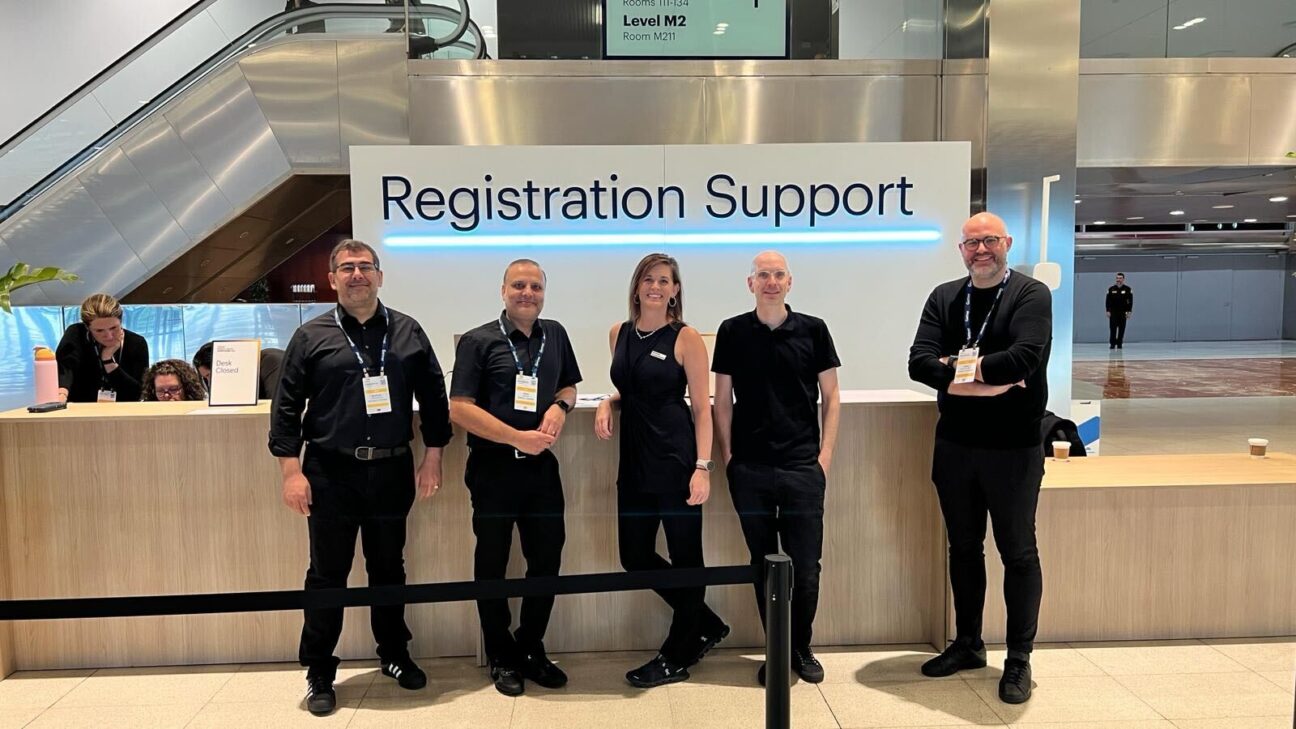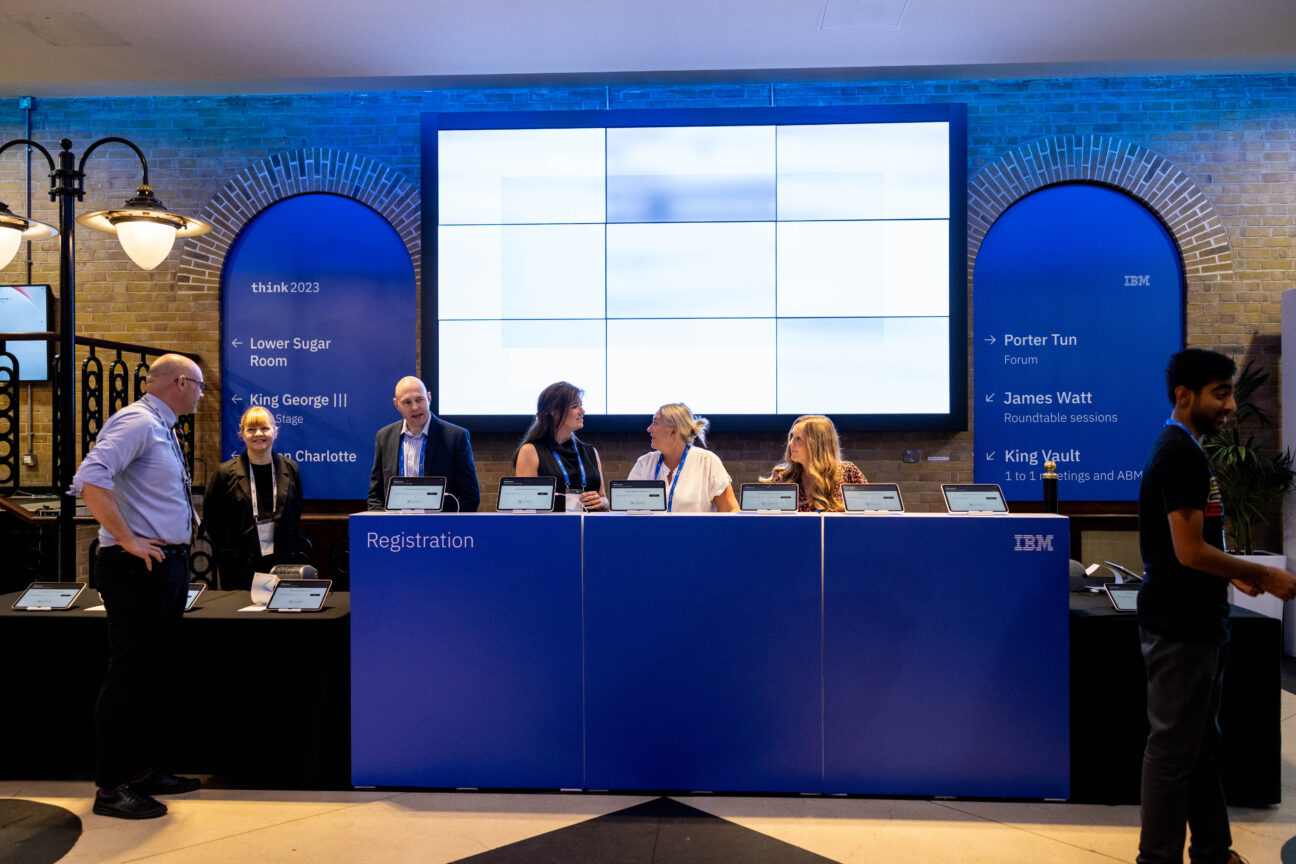
David McClelland
Senior Programme Director, Data and Registration
GPJ UK
Registration is often the unsung hero of live events but for our expert David McClelland, it’s the heartbeat of the attendee experience. With a career spanning five-star hotels, global tours, and data-driven insights, David’s take on event registration goes way beyond scanners and spreadsheets. In this candid Q&A, he shares what makes registration tick, why it’s so critical, and how agencies can elevate it from back-end process to brand moment.
“Our clients spent their budgets on wow moments INSIDE the event…so my job is not to keep all those eyeballs queuing OUTSIDE the event.“


Tell us how you initially get involved with registration, and what sparked your interest in this area?
Well, where do I begin? I graduated in 2001 and moved down to London shortly afterwards, chasing fame and fortune. After a month or so of abject poverty, I landed a job at a small education events company based in Camden called QS. They organised a world tour of master’s, PhD, and MBA student fairs. We’d sell tables in hotel ballrooms to universities and business schools, while also promoting the events to local graduates and young professionals. I started as an Events Assistant, supporting anyone and everyone who needed help… but I was immediately seduced by the glitz and glamour of travel.
I stayed at QS for ten years, working across sales, marketing and operations. I eventually carved out my own role as the ops lead for the entire global tour, living the good life of airports, five-star hotels, and incredible restaurants. We’d visit 65 cities a year across 40 countries, starting in South America and ending up in Australia, hitting every major city in between.
Over time, I oversaw the marketing, logistics and sales teams and led the charge on collecting student registration data, growing a database that became incredibly valuable to the international education community. This was pre-GDPR, so yes, we could spam the HELL out of those poor students. But what really fascinated me was building a registration form that could give real insight into student interests. I’d write an annual research paper based on our data and share it in publications like the South China Morning Post, The Independent, and Handelsblatt, among others I’ve long since forgotten.
After a decade, and on my eleventh work trip to Bogotá – I realised I’d “completed travel” and needed a fresh challenge. So I spent the next 12–18 months in Osaka, Japan, doing a little consulting, teaching some English, and singing karaoke to a VERY high standard. But I knew my career belonged back in London, so I packed my suitcase and headed home.
That’s when I joined GPJ. I was offered the chance to help IBM standardise and automate their global registration and attendee tracking systems — and they needed a partner with GPJ’s global reach to make it happen. It was right up my street. Ten years (and so many events) later, I can safely say: mission accomplished.
How did registration evolve to become a standalone function in experiential marketing, and what drove that shift?
Registration – and the collection of data – is the main driver for everything. Experiential marketing evolved out of this
It is quite unusual for an agency to have an integrated registration team, many companies use a third party for registration. What do you think are the advantages of being able to offer the registration service within our agency?
Every single event has some sort of registration element, and most require the collection of attendee information in some capacity. If two people have a conversation on an event show floor and nobody is there to scan them…did it really happen? Philosophers have been in agreement for years that it definitely did not!


But seriously, Registration has been a key part of our agency offering for decades, and we have some outstanding talent in this discipline – both in the UK and throughout our global offices. Our services in this area have evolved out of our client’s need for this service and our strong competencies in this area. They appreciate having one agency for creative, production, registration etc.
It is not our role to just print the badges, it is our role to understand and monitor attendee behaviour and provide critical, data driven insights to feed our creative and strategic programmes.
What teams do you typically collaborate with throughout an event from planning to wrap-up and how does that cross-functional teamwork contribute to the overall attendee experience?
That really varies from client to client. For example, the work we do for Gartner is purely registration, so we don’t tend to interact much with other departments — aside from, of course, the heroes in Finance who help me on a daily basis!
On the IBM account, I’ll work most with the Integrated Production teams from our global offices. For larger UK accounts, it’s regular catch-ups with the Executive Producers to make sure everything is on track or, more often than not, direct communication with the clients themselves.
Once you arrive onsite, what does a typical day look like for the registration team? Can you share the kinds of responsibilities you take on in the lead-up to doors opening and during the event?
No two events are ever really the same. But typically, the reg team needs to be onsite very early to make sure all check-in stations, printers, and systems are up, running, and ready for the crowds. Lanyards need to be laid out, reg desks cleaned and cleared, and host/hostess teams positioned, trained, and ready to greet attendees.
The unique challenge, and why registration is so fascinating, is that you know people are coming, and there’s nowhere to hide. If you’re not ready, the entire event could fall apart before the opening keynote even begins.
I’ve delivered thousands of IBM events over the last ten years at GPJ, as well as many others, and I still get a rush when the queues die down and the message comes through that everyone’s in and the keynote has started. That’s the job.
Once the rush is over, we either move on to attendee tracking, run reports and look for data anomalies, or… grab a coffee, relax, and start thinking about the next one.
What key elements make up an optimal registration experience from the attendee’s perspective? Does this vary at different events depending on the client?
I have always thought that a good registration process is one that is as quick and simple as possible. Larger conferences require a large footprint, but whether it’s 200 people or 5,000, I like a registration process that greets an attendee warmly, and badges them quickly. All the good stuff is inside the event space.
These things don’t need to be complicated and a lot of event registration system vendors or tech providers are always trying to reinvent the wheel or solve problems that don’t exist. If you have a set up that works and that is quick/efficient and you know how to use it then this, for me, is the optimal registration experience.
Our clients spent their budgets on wow moments INSIDE the event…so my job is not to keep all those eyeballs queuing OUTSIDE the event.
What is something attendees never realise goes into planning registration?
The time it all takes. Registration sites are often built a year in advance and tested for months before they go live.
Can you describe the most complex check-in scenario you have successfully managed? Were there any key takeaways from this experience?
This has been my first year working with a specific client and my first onsite experience was watching someone on our team calmly explain to an attendee whose registration was declined that his was a group ticket and one of his four colleagues that needed to register in order for this chap to get a free ticket had cancelled a week previously. So, for the attendee – who had flown over from the US to attend this conference – to get in he had to pay £5k. The colour drained from his face.
How do you design registration flows that make people feel welcomed and not just processed?
We make sure attendees are greeted by friendly faces the moment they arrive. Every attendee is a VIP and should be treated as such. These people are incredibly important to our clients, and we always need to keep that front of mind.
Brand Ambassadors chatting, eating, or scrolling on their phones at the reg desk? Absolute NOs.
Of course, we think carefully about things like where the counters go, how much hardware we need onsite, and how queue flow will work, and we are constantly analysing our own work in this area (attendee throughputs, badge print numbers per minute, hot/cold printers etc). But at its core, this is, and always has been, a human business. “People buy people” is something I learned a long time ago, and it holds true in every area of events. Especially at that crucial moment when an attendee walks through the door.
If you’re warm, welcoming, and friendly, you leave a lasting positive impression. It’s all about the vibe. Every attendee comes through registration one by one, and that gives us a unique opportunity to connect. If they leave that interaction with a negative feeling, there’s a good chance it’ll colour their whole event experience.
With technology evolving, attendee expectations rising, and events becoming more hybrid and data-driven, what do you see as the future of registration at GPJ? Are there any innovations, challenges, or strategic shifts on the horizon that you’re particularly excited about?
Our challenge, and it’s not just a challenge for registration is a decrease in client budgets. Technology is evolving and there are innovations every five minutes in the registration tech space…facial recognition, fingerprints, app-driven badges, for example, but we are obligated to spend our clients money wisely. It is easy to get seduced by a salesman promising the world, but what I have found over the years is that our key function is to understand exactly what our clients are trying to achieve and what data they want to collect to fulfill that goal. Then we have to be laser focused on how we capture that. What I often see is a lot of data is captured for the sake of it, that will never be used for anything! Every data point captured onsite or pre-event has to drive a specific insight or sales goal, otherwise it is wasted effort and money.


My vision for the future of registration at GPJ is threefold:
- Keep doing what we are doing, but continually improve. Registration is a core discipline at GPJ and we strive for perfection on all projects at all times. We’re not quite perfect yet, but we’re always working towards it.
- Grow. I am an ambitious person, and I love to build. If the Registration Department is the opportunity at GPJ that I’ve been given, then I’ll make it the largest and most efficient department in the company. That’s just how I’m wired!
- Focus on our data capacity. My department is called Data and Registration, and the registration part is ticking along nicely at the moment so I would like to focus more time on the data part. The agency’s priorities are in our creative output so I need to figure out how I can position our team front and centre in that area. Watch this space as I have a few ideas!
For someone interested in a career in events registration, what skills do you consider essential in this field?
For the most part a good registration person has an excellent attention to detail, an analytical mind and is capable of remaining calm in stressful situations. I’ve always been of the belief that if you are bright, inquisitive and take pride in your work then I, for one, would welcome you into my team.




